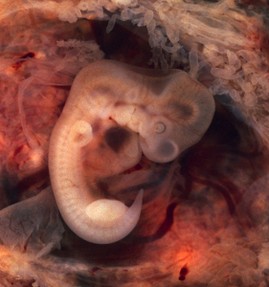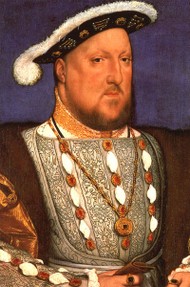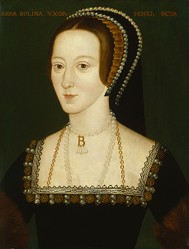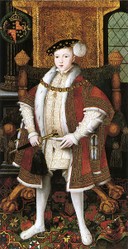During my pregnancy, I had to have my blood checked to see if I was rhesus negative. I already knew I was—I knew my blood type—but I didn’t quite understand what it meant. Once I found out, I started to wonder whether Anne Boleyn was rhesus negative and did some digging. While nothing can be confirmed, there is support for this and unfortunately it would have meant it would have been harder for her to have any more children after Elizabeth Tudor.

Anne Boleyn and Her Miscarriages: Was She Rhesus Negative?
Anne Boleyn had at least two miscarriages after the birth of Elizabeth Tudor. While Henry VIII believed it was a sign from God, is there a medical reason behind them?
What Does It Mean to be Rhesus Negative (RhD negative)
Before we decide whether Anne Boleyn was Rhesus negative, it is important to understand what it means.
 Rhesus negative is when the blood type is a negative one. I am A-, like my mother. My sister and father, on the other hand, and my own daughter have the A+ blood type so are Rhesus negative. This causes problems during pregnancies and labour. According to the BabyCentre.co.uk, those who are rhesus positive have the D antigen protein on their red blood cells. This D antigen is now administered through injections for those who are RhD negative. These injections, unsurprisingly, weren’t around in Tudor England!
Rhesus negative is when the blood type is a negative one. I am A-, like my mother. My sister and father, on the other hand, and my own daughter have the A+ blood type so are Rhesus negative. This causes problems during pregnancies and labour. According to the BabyCentre.co.uk, those who are rhesus positive have the D antigen protein on their red blood cells. This D antigen is now administered through injections for those who are RhD negative. These injections, unsurprisingly, weren’t around in Tudor England!
The problem arises if some of the blood from an RhD positive baby enters the blood of an RhD negative mother. The immune system reacts against some of the D antigen going into the body and believes that it is a disease. It will then produce antibodies to fight off this “infection”, usually leading to a miscarriage or stillbirth of any future babies. It is important to note that it is never harmful in the first pregnancy!
It will only affect future pregnancies if the baby is RhD positive. The blood cells of the baby are attacked by your antibodies, causing anaemia. This can cause fluid retention, heart failure and other life-threatening issues for the unborn child. Babies that do survive the pregnancy will struggle to cope with the number of blood cells and the liver doesn’t work properly. It can cause jaundice and other problems. The good news now is that there are injections to help this. These injections of anti-D stop the immune system from creating the antibodies.
From Anne Boleyn File's Owner Claire Ridgway
 |
| The Fall of Anne Boleyn: A Countdown |
Was Anne Boleyn Rhesus Negative?
Did Anne Boleyn suffer from something she couldn't control?
It is possible that Anne Boleyn was RhD negative. It would explain why she had a healthy baby girl and then struggled with at least two miscarriages afterwards. For this to happen, Henry VIII would have been RhD positive. It is more likely for people to be Rhesus positive (Babycentre.co.uk states that 85% of Caucasians are positive.
Of course, this was a medical condition that wasn’t even understood then! It was still believed then that women choose the sex of the baby and not the man. Even if it was understood, there was nothing that anyone could have done to help her since the injections were not around. It would be interesting to know how her future would have panned out had they known about this possible issue.
This is a theory that Retha Warnicke puts forward. However, she has been known to put forward some interesting and sometimes crazy theories. One of her biggest is how all the men accused of adultery with Queen Anne were ambiguous in their sexuality; something that Showtime’s The Tudors played on with a relationship between George Boleyn and Mark Smeaton.
Why Did Anne Boleyn Suffer from Miscarriages
There are other theories as to why she had at least two miscarriages and they can't be overlooked!
 It is worth pointing out that Anne Boleyn was not the only one of Henry VIII’s wives to have numerous miscarriages (the exact amount unknown). Catherine of Aragon also suffered numerous miscarriages, stillbirths and babies dying within weeks, days or hours of their births. It was simply the time that they lived in. The medical care was medieval and non-existent and they just didn’t know enough about pregnancy. They believed that women had to remain in confinement before the expected birth of their baby, which involved dark and hot rooms!
It is worth pointing out that Anne Boleyn was not the only one of Henry VIII’s wives to have numerous miscarriages (the exact amount unknown). Catherine of Aragon also suffered numerous miscarriages, stillbirths and babies dying within weeks, days or hours of their births. It was simply the time that they lived in. The medical care was medieval and non-existent and they just didn’t know enough about pregnancy. They believed that women had to remain in confinement before the expected birth of their baby, which involved dark and hot rooms!
Miscarriages were common and they all knew that. Miscarriages are still something that plague pregnancies today. 25% of pregnancies end with a miscarriage, usually within the first 12 weeks. There is still so much that the medical professionals don’t know about this part of a women’s life.
Of course, there is also the factor of stress. It was a terrible time to be a queen consort. Anne had already seen how Henry pushed aside his wife of 20 years. Sure, she had a lot to do with it, but there would have always been something in the back of her mind that he would do the same to her—or worse! Her fears were justified in the end but could you imagine how those fears would play havoc on the body? Stress isn’t good for a person now, let alone in the 16th century. Her stress levels would have been sky-high.
While watching out for women trying to steal the king, Anne also had the duty to deliver a son. Remember that they believed women were in charge of the baby’s gender. She had already promised him one and disappointed by delivering Elizabeth Tudor (if only they knew the woman she would become), so there was a lot of pressure by the time of her second and third pregnancy.
What If Anne Boleyn Did Have a Son?
Get the first two books from the Anne Boleyn Trilogy
 |  |
| The Boleyn Deceit: A Novel (Ann Boley... | The Boleyn King: A Novel (Anne Boleyn... |
Debunked Theories for Anne Boleyn’s Miscarriages
There are some old theories that have been proven to be wrong. Rhesus negative can never be one of them but it is worth remembering what they were.
 The theory of Rhesus negative isn’t widely accepted but that’s because it can never be proven—or disproven. It will always just be a theory based on intellectual knowledge of the problem today. However, there is one theory that has been debunked by historians: the belief of Henry having syphilis.
The theory of Rhesus negative isn’t widely accepted but that’s because it can never be proven—or disproven. It will always just be a theory based on intellectual knowledge of the problem today. However, there is one theory that has been debunked by historians: the belief of Henry having syphilis.
This was arguably the most common sexual transmitted infections in Tudor England. It was common among prostitutes but it is also possible that Henry VIII contracted it due to his many affairs—and he certainly had a few! The disease would cause impotency in men, which could explain his lack of heirs from future wives, and lead to miscarriages and stillborn children. It would explain why Catherine of Aragon and Anne Boleyn both suffered so many losses between them.
While this was a deadly disease at the time—treatment is only relatively new in the medical community—there was a common treatment known as mercury. There is no evidence that mercury was used on Henry VIII. Another factor is that there were three legitimate and at least one illegitimate children from the Tudor monarch.
Another debunked theory is that Anne was poisoned. Edward Seymour, Cardinal Wolsey and Thomas More have all been accused of using secret poison (Cantrella of Borgia). There are two big problems with that accusation: Wolsey died in 1533 in prison and More was executed in 1535! They couldn’t have poisoned Queen Anne and I don’t think they would have. Both were extremely religious people. More only executed those he believed to be heretics, believing it was the work of God, and Wolsey preferred to stay away from warfare. Seymour is a possibility but did he have the means at that time to cause the miscarriages? He was still building power until 1536, after Anne’s final miscarriage. Jane Seymour had the means but would she have risked her soul killing an innocent child?
I am a big fan of the theory that she was Rhesus negative. It is something that can never be proven but there is a lot of evidence to support the possibility. Of course, the life and times during Tudor England would definitely not have helped; nor would the stress that Anne Boleyn was under. In the end, the reasons for the miscarriages didn’t matter. Henry VIII believed it was a sign from God that his marriage was not valid and Anne was executed on May 19, 1536, just four months after her final miscarriage and three years after becoming Queen Consort of England.
You might also like
England Under the Tudors: Would King Edward VI Have Been a Goo...Edward VI reigned between 1547 and 1553 when he was just a boy. It's hard to ...
Lady Jane Boleyn: Vindictive Woman or Pawn in a Plot?Jane Boleyn is known for her part in bringing down the Boleyn faction. How mu...






 Alternate History: What If Mary I Had a Child?on 01/26/2015
Alternate History: What If Mary I Had a Child?on 01/26/2015
 Francis II of France Dies: Mary, Queen of Scots Returns Homeon 12/05/2014
Francis II of France Dies: Mary, Queen of Scots Returns Homeon 12/05/2014
 Does Writedge Pay? Payment Proofon 12/03/2014
Does Writedge Pay? Payment Proofon 12/03/2014
 Alternate History: What If Lady Jane Grey Was Not Deposed?on 11/11/2014
Alternate History: What If Lady Jane Grey Was Not Deposed?on 11/11/2014



Comments